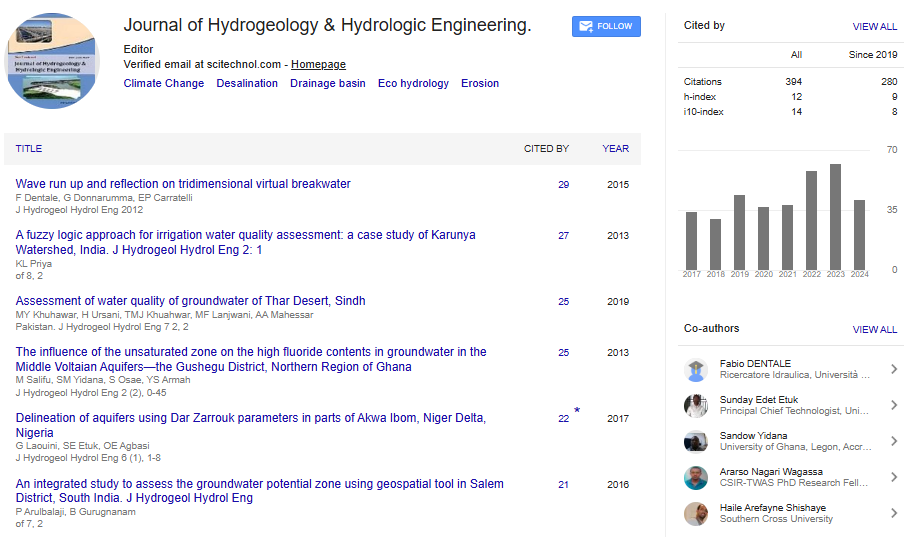Perspective, J Hydrogeol Hydrol Eng Vol: 12 Issue: 6
The study of the Important Function of Surface Water in Earth's Ecosystems: Navigating the Depths
Rebecca Muenich*
1Department of Agriculture and Environment, University of Western Australia, Crawley, Australia
*Corresponding Author: Rebecca Muenich,
Department of Agriculture and
Environment, University of Western Australia, Crawley, Australia
E-mail: muenichr2@gmail.com
Received date: 20 November, 2023, Manuscript No. JHHE-23-123088;
Editor assigned date: 22 November, 2023, PreQC No. JHHE-23-123088 (PQ);
Reviewed date: 07 December, 2023, QC No. JHHE-23-123088;
Revised date: 15 December, 2023, Manuscript No. JHHE-23-123088 (R);
Published date: 25 December, 2023, DOI: 10.4172/2325-9647.1000293
Citation: Muenich R (2023) The study of the Important Function of Surface Water in Earth's Ecosystems: Navigating the Depths. J Hydrogeol Hydrol Eng 12:6.
Description
Surface water, comprising rivers, lakes, oceans, and other open bodies, plays a pivotal role in shaping the planet's dynamic ecosystems. As a vital component of the hydrological cycle, surface water influences climate patterns, sustains diverse habitats, and serves as a lifeline for countless species, including humans. This comprehensive exploration delves into the multifaceted significance of surface water, shedding light on its ecological, social, and economic dimensions.
The hydrological symphony
At the heart of Earth's hydrological system, surface water orchestrates a symphony of interconnected processes. From the precipitation that replenishes rivers and lakes to the intricate dance of evaporation and condensation shaping our climate, the hydrological cycle is a delicate balance maintained by surface water. Understanding this intricate web is essential for comprehending the impact of climate change on water resources, weather patterns, and global ecosystems.
Biodiversity hotspots
Surface water serves as a cradle for biodiversity, fostering a rich tapestry of life in aquatic ecosystems. Rivers and lakes, in particular, host an array of species adapted to their unique conditions. Exploring the intricacies of these ecosystems unveils the interconnected relationships among flora and fauna. From the migratory journeys of fish to the delicate balance between predator and prey, surface water ecosystems are hubs of biodiversity that merit close examination.
Ecosystem services
Beyond its role in sustaining biodiversity, surface water provides a plethora of ecosystem services essential for human well-being. From serving as a source of drinking water to supporting agriculture through irrigation, surface water is the lifeblood of societies around the globe. Examining these services sheds light on the delicate balance between human activities and the resilience of surface water ecosystems. Sustainable management practices are essential to ensure the continued provision of these services without compromising the integrity of aquatic environments.
Threats to surface water quality
However, the health of surface water ecosystems is under threat from various anthropogenic activities. Pollution, deforestation, and climate change pose significant challenges to the quality of surface water. Understanding the sources and impacts of contaminants is imperative for developing effective conservation strategies. From industrial discharges to agricultural runoff, this section explores the multifaceted threats to surface water quality and the potential consequences for both ecosystems and human populations.
Human-water interactions
As populations grow and societies evolve, the relationship between humans and surface water becomes increasingly complex. Urbanization, industrialization, and agricultural expansion reshape the landscape, altering the natural flow of rivers and impacting aquatic habitats. The delicate balance between meeting human needs and preserving the integrity of surface water ecosystems requires innovative solutions and a holistic understanding of the socioecological dynamics at play.
Global perspectives on water governance
Effective water governance is essential for ensuring the sustainable use and management of surface water resources. This section examines diverse approaches to water governance around the world, highlighting successful strategies and identifying areas for improvement. From community-based initiatives to international agreements, exploring the spectrum of governance models provides valuable insights into the challenges and opportunities associated with safeguarding surface water on a global scale.
Future challenges and opportunities
Looking ahead, the future of surface water presents both challenges and opportunities. Climate change, population growth, and increasing demand for water resources require innovative solutions and a paradigm shift in our approach to water management. This final section explores emerging technologies, policy frameworks, and community-driven initiatives that hold promise in addressing the complex challenges facing surface water ecosystems.
 Spanish
Spanish  Chinese
Chinese  Russian
Russian  German
German  French
French  Japanese
Japanese  Portuguese
Portuguese  Hindi
Hindi 
